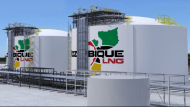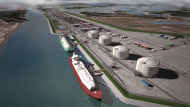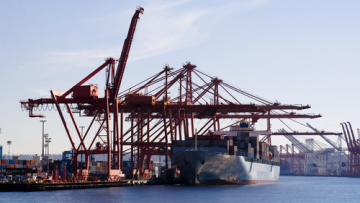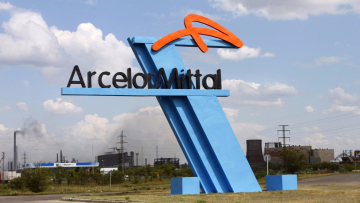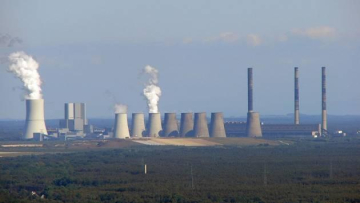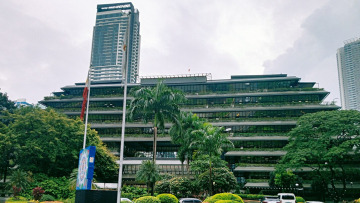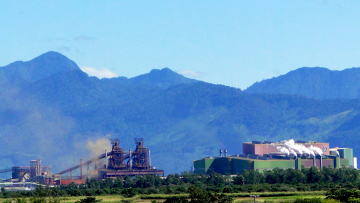Frontline communities take the stage at bank AGM’s
Deniz Ozkil, Climate Campaigner, BankTrack

Deniz Ozkil, Climate Campaigner, BankTrack
This year, we joined coalitions from all over the world to expose the harms caused by commercial banks’ continued financing of the fossil fuel industry. We were directly present at the AGMs of ING, Standard Chartered, and Raiffeisen and submitted questions to Barclays, Rabobank, Banco Santander, HSBC and UniCredit.
When everybody leaves the room
ING Bank's annual general meeting was an activist gathering from the start. Before the doors to the Muziekgebouw in Amsterdam opened to welcome their guests to the AGM, over a hundred activists, campaigners, and frontline community members had already gathered in front of the building. Soon after, a boat was seen sailing on the canals of Amsterdam with four lions - ING Bank’s mascot - on board and decorated with a banner that read ‘ING: Banker of the climate crisis’.
This action organised by Milieudefensie (Friends of the Earth Netherlands) was followed by speeches from our guests - representatives from communities affected by operations financed by ING Bank. They held a banner that read “We are not your sacrifice zone” and everybody chanted “We believe that we will win” together. In the meantime, Extinction Rebellion Netherlands was busy blockading the street leading to the meeting venue, hindering many shareholders from reaching the location.
At the meeting, frontline leaders from the United States, Mexico, Liberia, Brazil, and Czechia voiced their grievances and asked questions to the bank’s board. In particular, they questioned ING’s financing of over a dozen new LNG terminals in the US Gulf Coast, Czech coal-producer EPH, and companies with mediocre human rights records such as ArcelorMittal and Ternium. A full recap of these questions and responses can be found in our earlier news item.
The questions from frontline communities were followed by Milieudefensie activists’ questions regarding the bank’s alignment with the Paris Agreement. Eventually, the whole crowd, unsatisfied by the board’s evasive and repetitive answers, left the room en masse, leaving only around a dozen non-activist shareholders behind.
Following the meeting, we co-organised an event with our partners at Fossil Free Netherlands, where a wide crowd of activists and campaigners got to hear first-hand the real life stories from the frontline impacts of ING’s financing.
Fossil fuels are trouble, can you not see?
At the Standard Chartered AGM, we teamed up with CEED, UK Climate Choir, and urgewald to draw attention to the bank’s financing for San Miguel Corporation (SMC). SMC is the culprit behind the destruction of the Verde Island Passage in the Philippines - a marine corridor that supports the livelihoods of over 2 million people and is known as the ‘Amazon of the oceans’ due to its rich biodiversity.
Before it was time for questions, Climate Choir treated all the shareholders to a great performance of a fossil-fuel-adapted version of the Taylor Swift song "I Knew You Were Trouble" and then left the room singing.
We proceeded to question the bank about Standard Chartered’s financing of San Miguel Corporation and the planned build-out of gas in the Verde Island Passage. This question was followed by another regarding the bank’s financing of the Mozambique LNG, which is set to displace thousands of people in the extraction zone. The bank’s responses were evasive.
Meanwhile, outside, another group of activists were holding banners and placards, singing, talking to bystanders, and handing out flyers about the Verde Island Passage and Mozambique LNG.
In another action of the Protect Verde Island Passage (VIP) coalition, our partners urgewald and CEED assisted the fisherman and vice president of the local fisherfolk group Bukluran ng Mangingisda sa Batangas (BMB) Maximo Bayubay in attending the annual general meeting of shareholders of UBS. Maximo publicly addressed investors and shareholders of Switzerland-based bank UBS Group, questioning the bank on its continued financing of San Miguel Corporation and fossil gas projects in the Philippines.
At the same time, Collective Breakfree Switzerland, Greenpeace Switzerland, Campax and KlimaAllianz Switzerland were protesting outside of the meeting to draw attention to UBS’ involvement in financing destruction in the Verde Island Passage.
Europe’s biggest fossil bank is still banking on coal
Barclays held its annual general meeting just a few days before, once again leading the charts in fossil fuel financing, according to the Banking on Climate Chaos report.
We submitted a question on Barclays' long-running underwriting of bond issuances by Adani, the world’s largest private coal developer, and how this is evidence of Barclays’ continuing refusal to rule out financing companies expanding coal mining or power capacity. The question also referenced human rights violations by Adani, and proposed a meeting with a community representative. In response, Barclays said it would meet with "any Barclays customer" while denying knowledge of Adani’s problematic inter-party transactions.
Banks' sustainability investments
In addition to exposing banks for their continued role in accelerating the climate chaos, we recently took up the task of engaging with banks to encourage increasing their sustainable power financing.
With this goal in mind, together with our partners in Beyond Fossil Fuels coalition, we asked Danske Bank whether they would commit to achieving a 6:1 finance ratio by 2030, meaning for every dollar spent on fossil fuels, six dollars would be spent on sustainable power supply solutions. The bank refused, citing uncertainties in demand and competition. We remain in conversation with the bank to encourage them to adopt more ambitious and concrete measures to support sustainable power.
Banks blocking shareholder participation
In a concerning development aimed at avoiding scrutiny and civil society access , banks are increasingly limiting activist participation by extending security measures, making use of legal systems to have their meetings behind closed doors, and even attempting to sue shareholders for submitting climate-related proposals.
Our attempt to attend Rabobank's annual meeting to raise concerns about the bank's financing of the Barossa Gas Project was denied by the bank, citing that the meeting was “solely for discussing annual results and certificate prices” - seeming to consider only financial results as worthy of discussion, leaving social and environmental results as externalities not worth considering, not even as the serious risks that they pose to financial results.
In response, we reiterated the importance of taking responsibility for the climate chaos and the human rights violations that are caused by this Dodgy Deal, which would not be possible without Rabobank’s financing. The project, led by Santos, has faced significant opposition from the First Nations people of the Tiwi Islands. (Sign this petition to support the Tiwi Elders.)
At other times, shareholder participation was hindered by banks’ inefficient registration processes and technical difficulties. This happened with Banco Santander for us, where our partner Bekah Hinojosa of Rainforest Action Network was not able to attend the meeting due to what the bank reported as a ‘technical issue’. Following this incident, we sent our question to the bank, and our question was answered outside the designed process.
Together with Bekah, we questioned Banco Santander on their financing for Rio Grande LNG, a planned export terminal with massive negative impacts for Gulf Coast communities. When asked whether it would commit to meeting with the community members, the bank responded with the generic, evasive response of “we cannot comment on specific clients or transactions.”
Banks under fire for financing fossil steel
In March, Reclaim Finance revealed the 50 largest banks financing the fossil steel industry, a sector that is responsible for 11% of global CO2 emissions. We attended four AGMs of the banks on this list to question them on their financing for this climate-destructive sector, and dodgy steel clients like ArcelorMittal and Ternium.
While ING was the first bank to exclude future dedicated finance for coal-fired steel production, our Banks and Steel campaigner Julia Hovenier attended their AGM to question the loopholes in their new policy that leave the door open for CCS and corporate level finance to companies expanding fossil steel assets. Additionally, communities from Liberia and Mexico impacted by ArcelorMittal’s operations, and a community leader from Brazil impacted by Ternium questioned the CEO on their financing for the companies.
We also questioned Banco Santander, UniCredit, and HSBC on whether their recently set targets for steel decarbonisation would impact their finance for companies like ArcelorMittal and Ternium, who are investing heavily in coal-expansion. All banks responded that they have set in place internal mechanisms for assessing their steel clients on climate. UniCredit also responded that they are considering adopting a policy on metallurgical coal. While these are promising first steps, stopping super polluters like ArcelorMittal and Ternium will require banks to move beyond target setting, and adopt policies that draw a clear red line for steel makers: no new coal for steel.
Banks pressured to exit Russia
Over two years after the Russian invasion of Ukraine, many foreign banking institutions have taken steps to halt business operations in Russia or have completely exited the country. However, a few international banks continue to operate with business as usual, making record profits and paying hefty taxes to Putin, thereby replenishing Russia's war coffers.
Austrian Raiffeisen Bank is the largest foreign bank remaining in Russia. Despite repeated promises to exit the country, the bank’s profits more than tripled since the start of the war, making up half of the group’s total profits. In 2023 alone, the bank's tax contributions to the Kremlin amounted to €464 million.
On April 4, 2024, we attended the bank’s annual general meeting in Vienna. We partnered with peace activist Victoria Nikolaevskaja to make an intervention and question the bank on its continued presence in Russia. We also supported partners ATTAC Austria to organise a simultaneous action outside the meeting venue, which received media attention in Austria and beyond.
A petition demanding Raiffeisen Bank to leave Russia, which was coordinated by WeMove Europe, B4Ukraine and BankTrack, received over 50,000 signatures and is still open for signatures.
Italy’s UniCredit is the second-largest foreign bank still operating in Russia. Since UniCredit opted to hold its annual general meeting behind closed doors, we submitted a written question to the bank. With nearly half of Russia’s budget currently funding its brutal war on Ukraine, we questioned UniCredit about its tax contributions to the Kremlin, including the payment of a windfall levy imposed in 2023. UniCredit was not very forthcoming in its response. Despite stating that it is "committed to an orderly and gradual reduction, as well as the derisking of Russian exposure," recent news of the bank contesting the European Central Bank's demands to cut ties with Russia suggests otherwise.
Our demands from banks
In a moment when the world is not on track to reach the 50% decrease in global emissions that the UN’s Intergovernmental Panel on Climate Change science shows is necessary, and even after the International Energy Agency stated in 2021 already that “there is no need for investment in new coal, oil and natural gas”, we see banks continuing to gamble on climate chaos.
We call on banks to:
-
Stop Fossil Fuel Proliferation
-
Stop False Solutions Proliferation
-
Plan a Just Fossil Finance Phase-out
-
Fast track Just Transition Finance
-
Conduct comprehensive Climate, Human Rights and Nature Due Diligence & Reporting
Until these demands are met, we will keep campaigning for them through AGM activism, bank engagement, raising awareness about climate risks, social movement mobilizing, or any other tools we see as best fit for purpose in times of climate emergency.
It’s about time to act to safeguard present and future generations.

